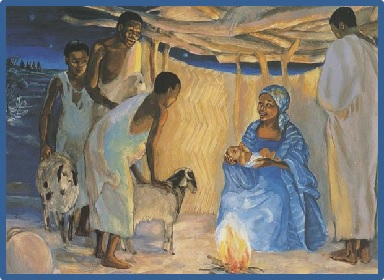
From ‘ADMIRABILE SIGNUM’ – apostolic letter of Pope Francis on the meaning and importance of the nativity scene given on the 1st December 2019. A few extracts chosen by MW:
‘The enchanting image of the Christmas crèche, so dear to the Christian people, never ceases to arouse amazement and wonder. The depiction of Jesus’ birth is itself a simple and joyful proclamation of the mystery of the Incarnation of the Son of God. The nativity scene is like a living Gospel rising up from the pages of sacred Scripture. As we contemplate the story, we are invited to set out on a spiritual journey, drawn by the humility of the God who became man in order to encounter every man and woman. We come to realize that so great is his love for us that he became one of us, so that we in turn might become one with him.
Coming into this world, the Son of God was laid in the place where animals feed. Hay became the first bed of the One who would reveal himself as “the bread come down from heaven” (Jn 6:41). Saint Augustine, with other Church Fathers, was impressed by this symbolism: “Laid in a manger, he became our food” (Sermon 189, 4). Indeed, the nativity scene evokes a number of the mysteries of Jesus’ life and brings them close to our own daily lives.
Why does the crib arouse such wonder and move us so deeply? First, because it shows God’s tender love: the Creator of the universe lowered himself to take up our littleness. The gift of life, in all its mystery, becomes all the more wondrous as we realize that the Son of Mary is the source and sustenance of all life. In Jesus, the Father has given us a brother, who comes to seek us out, whenever we are confused or lost, a loyal friend ever at our side. He gave us his Son who forgives us and frees us from our sins.
“Let us go to Bethlehem and see this thing that has happened, which the Lord has made known to us” (Lk 2:15). So the shepherds tell one another after the proclamation of the angels. A beautiful lesson emerges from these simple words. Unlike so many other people, busy about many things, the shepherds become the first to see the most essential thing of all: the gift of salvation.
It is the humble and the poor who greet the event of the Incarnation.
The shepherds respond to God who comes to meet us, in the Infant Jesus, by setting out to meet him with love, gratitude and awe.
Thanks to Jesus, this encounter between God and his children gives birth to our religion and accounts for its unique beauty, so wonderfully evident in the nativity scene.
The presence of the poor and the lowly in the nativity scene remind us that God became man for the sake of those who feel most in need of his love and who ask him to draw near to them. Jesus, “gentle and humble in heart” (Mt 11:29), was born in poverty and led a simple life in order to teach us to recognize what is essential and to act accordingly. By being born in a manger, God himself launches the only true revolution that can give hope and dignity to the disinherited and the outcast: the revolution of love, the revolution of tenderness.
From the manger, Jesus proclaims, in a meek yet powerful way, the need for sharing with the poor as the path to a more human and fraternal world in which no one is excluded or marginalized.
Wherever it is, and whatever form it takes, the manger speaks to us of the love of God, the God who became a child in order to make us know how close he is to every man, woman and child, regardless of their condition.
Dear brothers and sisters, the manger is part of the precious yet demanding process of passing on the faith. Beginning in childhood, and at every stage of our lives, it teaches us:
to contemplate Jesus,
to experience God’s love for us,
to feel and believe that God is with us
and that we are with him,
his children, brothers and sisters all,
thanks to that Child who is the Son of God and the Son of the Virgin Mary.
And to realize that in that knowledge we find true happiness.
Like Saint Francis, may we open our hearts to this simple grace, so that from our wonderment a humble prayer may arise: a prayer of thanksgiving to God, who wished to share with us his all, and thus never to leave us alone.’ (Pope Francis)
‘When the song of the angels is stilled,
when the star in the sky is gone,
when the kings and princes are home,
when the shepherds are back with their flock,
the work of the Incarnation begins:
to find the lost,
to heal the broken,
to feed the hungry,
to release the prisoner,
to rebuild the nations,
to bring peace among others,
to make music in the heart.
Amen.’ (Howard Thurman).

